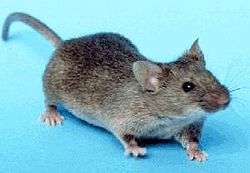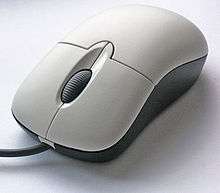Definify.com
Webster 1913 Edition
Mouse
Mouse
(mous)
, Noun.
pl.
Mice
(mīs)
. 1.
(Zool.)
Any one of numerous species of small rodents belonging to the genus
Mus
and various related genera of the family Muridae
. The common house mouse (Mus musculus
) is found in nearly all countries. The American white-footed mouse
, or deer mouse
(Peromyscus leucopus
, formerly Hesperomys leucopus
) sometimes lives in houses. See Dormouse
, Meadow mouse
, under Meadow
, and Harvest mouse
, under Harvest
. 2.
(Naut.)
(a)
A knob made on a rope with spun yarn or parceling to prevent a running eye from slipping.
(b)
Same as 2d
Mousing
, 2. 3.
A familiar term of endearment.
Shak.
4.
A dark-colored swelling caused by a blow.
[Slang]
5.
A match used in firing guns or blasting.
Field mouse
, Flying mouse
Mouse bird
(Zool.)
, a coly.
– Mouse deer
(Zool.)
, a chevrotain, as the kanchil.
– Mouse galago
(Zool.)
, a very small West American galago (
– Galago murinus
). In color and size it resembles a mouse. It has a bushy tail like that of a squirrel. Mouse hawk
. (Zool.)
(a)
A hawk that devours mice
. (b)
The hawk owl; – called also
– mouse owl
. Mouse lemur
(Zool.)
, any one of several species of very small lemurs of the genus
– Chirogaleus
, found in Madagascar. Mouse piece
(Cookery)
, the piece of beef cut from the part next below the round or from the lower part of the latter; – called also
mouse buttock
.Mouse
,Verb.
I.
[
imp. & p. p.
Moused
; p. pr. & vb. n.
Mousing
.] 1.
To watch for and catch mice.
2.
To watch for or pursue anything in a sly manner; to pry about, on the lookout for something.
Mouse
,Verb.
T.
1.
To tear, as a cat devours a mouse.
[Obs.]
“[Death] mousing the flesh of men.” Shak.
Webster 1828 Edition
Mouse
MOUSE
,Noun.
1.
A small animal of the genus Mus, inhabiting houses. The name is also applied to many other species of the genus, as the field mouse, meadow mouse, rock mouse, &c.2.
Among seamen, a knob formed on a rope by spun yarn or parceling.MOUSE
, v.i.. mouz. To catch mice.MOUSE
,Verb.
T.
To mouse a hook, with seamen, is to fasten a small line across the upper part to prevent unhooking.
Definition 2026
mouse
mouse
English

A mouse (rodent).

A computer mouse.
Noun
mouse (plural mice)
- Any small rodent of the genus Mus.
- 1893, Walter Besant, The Ivory Gate, chapter II:
- At twilight in the summer there is never anybody to fear—man, woman, or cat—in the chambers and at that hour the mice come out. They do not eat parchment or foolscap or red tape, but they eat the luncheon crumbs.
- 1893, Walter Besant, The Ivory Gate, chapter II:
- (informal) A member of the many small rodent and marsupial species resembling such a rodent.
- A quiet or shy person.
- (computing) (plural mice or, rarely, mouses) An input device that is moved over a pad or other flat surface to produce a corresponding movement of a pointer on a graphical display.
- (boxing) Hematoma.
- (nautical) A turn or lashing of spun yarn or small stuff, or a metallic clasp or fastening, uniting the point and shank of a hook to prevent its unhooking or straighening out.
- (obsolete) A familiar term of endearment.
- (Can we find and add a quotation of Shakespeare to this entry?)
- A match used in firing guns or blasting.
- (set theory) A small model of (a fragment of) Zermelo-Fraenkel set theory with desirable properties (depending on the context).
Hypernyms
- (small rodent): rodent
Coordinate terms
- (small rodent): rat
- (input device): joystick, trackpad, trackball, pointing stick
Derived terms
Terms derived from mouse (noun)
|
Translations
rodent of the genus Mus
|
|
shy person
computing: input device
|
|
Verb
mouse (third-person singular simple present mouses, present participle mousing, simple past and past participle moused)
- (intransitive) To move cautiously or furtively, in the manner of a mouse (the rodent) (frequently used in the phrasal verb to mouse around).
- (intransitive) To hunt or catch mice (the rodents), usually of cats.
- (transitive, nautical) To close the mouth of a hook by a careful binding of marline or wire.
- Captain Higgins moused the hook with a bit of marline to prevent the block beckets from falling out under slack.
- (intransitive, computing) To navigate by means of a computer mouse.
- 1988, MacUser: Volume 4
- I had just moused to the File menu and the pull-down menu repeated the menu bar's hue a dozen shades lighter.
- 2009, Daniel Tunkelang, Faceted Search (page 35)
- Unlike the Flamenco work, the Relation Browser allows users to quickly explore a document space using dynamic queries issued by mousing over facet elements in the interface.
- 1988, MacUser: Volume 4
- (obsolete, nonce word, transitive) To tear, as a cat devours a mouse.
- Shakespeare
- [Death] mousing the flesh of men.
- Shakespeare
Derived terms
terms derived from mouse (verb)
|
Translations
to mouse around
|
|
to catch mice
to close the mouth of a hook
Related terms
See also
-
 mouse on Wikipedia.Wikipedia
mouse on Wikipedia.Wikipedia
-
 mouse (computing) on Wikipedia.Wikipedia
mouse (computing) on Wikipedia.Wikipedia
-
 Mus on Wikimedia Commons.Wikimedia Commons
Mus on Wikimedia Commons.Wikimedia Commons
-
 Computer mouse on Wikimedia Commons.Wikimedia Commons
Computer mouse on Wikimedia Commons.Wikimedia Commons
-
 Mice on Wikiquote.Wikiquote
Mice on Wikiquote.Wikiquote
-
 Mus on Wikispecies.Wikispecies
Mus on Wikispecies.Wikispecies
Anagrams
Italian
Noun
mouse m (invariable)
Derived terms
Anagrams
Portuguese
Etymology
Pronunciation
- (Brazil) IPA(key): /ˈmaw.zi/, /ˈmawz/
Noun
mouse m (plural mouses)
- (Brazil, computer hardware) mouse (input device used to move a pointer on the screen)
- (Brazil, loosely) pointer; cursor (moving icon that indicates the position of the mouse)
Quotations
For usage examples of this term, see Citations:mouse.
Synonyms
Romanian
Alternative forms
Etymology
Noun
mouse n (plural mouse-uri)
Declension
declension of mouse
| singular | plural | |||
|---|---|---|---|---|
| indefinite articulation | definite articulation | indefinite articulation | definite articulation | |
| nominative/accusative | (un) mouse | mouse-ul | (niște) mouse-uri | mouse-urile |
| genitive/dative | (unui) mouse | mouse-ului | (unor) mouse-uri | mouse-urilor |
| vocative | mouse-ule | mouse-urilor | ||